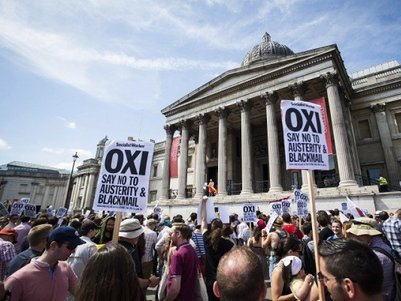A European referendum on popular initiative
Why?
There is already a European Citizens' Initiative procedure in place, but it is purely consultative, which often generates citizens’ frustration. Moreover, European peoples are sometimes called upon to express themselves directly by referendum, but these referendums occur in each nation separately, reducing the scope of their influence on EU decisions. Indeed, a referendum held in one country often clashes with the positions of other Member States’ governments, as was the case for Ireland in 2008, Greece in 2015, and the Netherlands in 2016. We need, therefore, a tool that is more powerful than the current European Citizens’ Initiative and more European than national referendums.
How?
Referendums on popular initiative would be allowed to change EU legislation. Petitions with 1 million signatures would be sent to the European Citizens' Assembly, which would select the issues worthy of a referendum. In this way, proposals would be filtered, but by ordinary citizens representative of the European people.
It would be essential that the referendums occur simultaneously in all Member States. Compared to national consultations spread over time, this would encourage a clear Europeanisation of the debate, which would help to bind governments to the popular verdict. The final decision would be taken, as in Switzerland, by a double majority (citizens and States), which would be consistent with the double majority system already in place in the EU Council.
In order to strengthen the democratic accountability of the Commission, a recall referendum should also be possible, on the basis of a petition supported by the European Citizens' Assembly.
There is already a European Citizens' Initiative procedure in place, but it is purely consultative, which often generates citizens’ frustration. Moreover, European peoples are sometimes called upon to express themselves directly by referendum, but these referendums occur in each nation separately, reducing the scope of their influence on EU decisions. Indeed, a referendum held in one country often clashes with the positions of other Member States’ governments, as was the case for Ireland in 2008, Greece in 2015, and the Netherlands in 2016. We need, therefore, a tool that is more powerful than the current European Citizens’ Initiative and more European than national referendums.
How?
Referendums on popular initiative would be allowed to change EU legislation. Petitions with 1 million signatures would be sent to the European Citizens' Assembly, which would select the issues worthy of a referendum. In this way, proposals would be filtered, but by ordinary citizens representative of the European people.
It would be essential that the referendums occur simultaneously in all Member States. Compared to national consultations spread over time, this would encourage a clear Europeanisation of the debate, which would help to bind governments to the popular verdict. The final decision would be taken, as in Switzerland, by a double majority (citizens and States), which would be consistent with the double majority system already in place in the EU Council.
In order to strengthen the democratic accountability of the Commission, a recall referendum should also be possible, on the basis of a petition supported by the European Citizens' Assembly.

